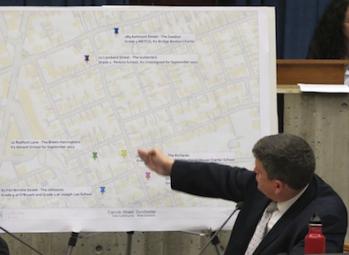May 24, 2012
 One neighborhood, nine schools: Councillor John Connolly referred to a map that detailed the locations and schools of parents in the Carruth Street area during a hearing on Tuesday.A City Hall hearing on Tuesday put the spotlight on several Dorchester families and their school-related plight: They all live in the Carruth Street corridor within blocks of each other, but their children go to different schools.
One neighborhood, nine schools: Councillor John Connolly referred to a map that detailed the locations and schools of parents in the Carruth Street area during a hearing on Tuesday.A City Hall hearing on Tuesday put the spotlight on several Dorchester families and their school-related plight: They all live in the Carruth Street corridor within blocks of each other, but their children go to different schools.
The children of Carl and Beth Nagy attend the Thacher Montessori School in Milton. Johanna and Orin Gutlerner have two children, with one enrolled in the Perkins Elementary School in South Boston and the other unassigned. The children of Karen and Michael Johnson are at the O’Bryant School of Math and Science in Roxbury and the Joseph Lee School in Dorchester.
Representatives from those three families joined two others at Committee on Education hearing to express their frustrations with the Boston Public Schools.
Beth Nagy moved to Dorchester in 1999, and she and her husband have two children, one in sixth grade and another in eighth grade. She remembers when her children used to hang out with the other neighborhood kids, and she was able to regularly talk with their parents.
“We really don’t see each other anymore,” she said, noting exceptions like Christmas, when they all go caroling, or Halloween, when they’re out trick-or-treating.
Her children started out at a Dorchester school – the Lee Academy Pilot School – but that was later dismantled as part of a system-wide restructuring in 2010.
Like the other parents at the hearing, she voiced her disappointment with the school lottery system. “It’s not really a choice,” she said, explaining her decision to enroll her children in the Thacher Montessori School, which comes with a 15-minute drive and tuition.
“I’m disillusioned now,” Nagy said.
Michael Harrington, who lives behind the Ashmont MBTA station with his partner and their two children, said one of his children received a sixth-choice school located four to six miles away. The commute would also mean trudging through a “congested” Dorchester Avenue, he said, adding that he and his partner, David Breen, may end up moving to the suburbs.
Looking at the rest of the panel, Harrington remarked that they all lived in the same area. “I don’t, frankly, know many of them,” he said with a tinge of sadness.
The hearing, put together by City Councillor At-Large John Connolly’s office, lasted for nearly five hours and featured six panels of parents from various neighborhoods.
“I think all of this testimony spoke to the need for massive reform to the current system,” Connolly said after the hearing. “However people feel, the current system leaves parents greatly frustrated and the Dorchester panel also spoke to the fact that it leaves neighbors not knowing each other or not able to bond together the way they’d like to.”
Mayor Thomas Menino has launched an effort to change the system, pledging a “radically different” system, with students being able to go to schools in their neighborhood, by next year. Laura Perille, a member of the task force that is advising Menino and the school district, provided councillors and parents with a brief update on their progress at the hearing.
Connolly told the Reporter that he has confidence in the task force charged with overhauling the school assignment policies. “I worry about the BPS bureaucracy either causing delays or not following through with the task force’s wishes, but I’m glad that there’s parents on that task force who are asking to get real data on how this system plays out for parents in every neighborhood,” he said.
At the hearing, Perille said the group has broken into subcommittees and is seeking data from Boston Public Schools officials in order to receive information other than the anecdotal kind.
Anecdotes and personal stories from each of the panelists were the focus on the Tuesday night hearing. Gayl Swaby, who has lived in Dorchester for over a decade, said her oldest was first assigned to South Boston, and then East Boston, “Which took us even further.” Her son now is part of the METCO program, which buses children to communities outside of Boston in the interest of diversity, and her daughter is in a new charter school, meaning Swaby must be at separate bus stops every morning.
Karen Johnson, who relocated her family from Pittsburgh to a Victorian house on Van Winkle Street in Dorchester several years ago, said there are few opportunities for her children in the Dorchester and Roxbury area, which has the largest number of underperforming schools. She also complained about the lack of after-school programming at some of them.
“I had taken these for granted with Pittsburgh public schools,” she said. Johnson, who has one child at the O’Bryant, said, “We’ve made it work,” adding, “I’m unhappy with the structure of the system and that children have to move so often.” If she had a chance to do it all over again, Johnson would probably not move into the city. “Which is a shame,” she said, “because it’s a great neighborhood.”



